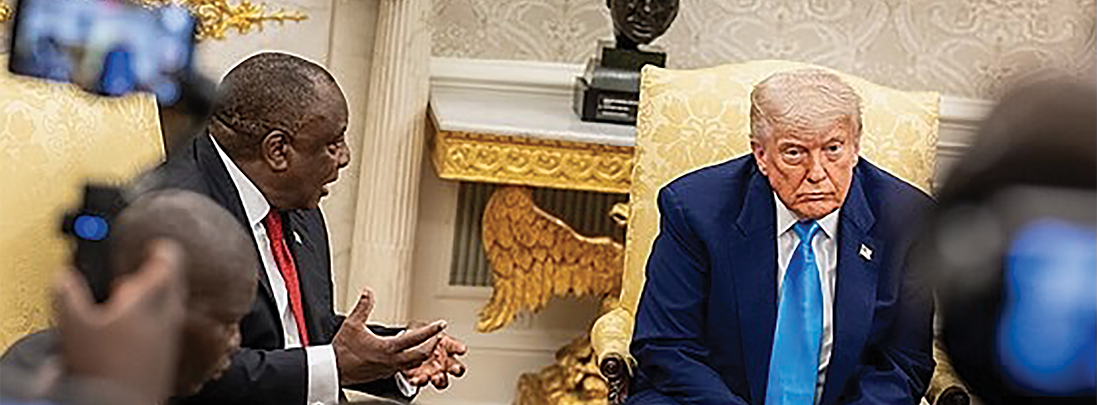PROPOSAL: Doing so, in exchange for a tariff waiver on exports to the US for a handful of highly subsidised, foreign-owned multinationals, is not “technically feasible or financially viable”, argues a South African energy expert…
By Pavan Kulkarni
South Africa’s proposal to buy liquefied natural gas (LNG) from the US for 10 years in exchange for a quota of duty-free exports for a small section of highly subsidised, foreign-owned multinationals shows the ineptitude of the “comprador presidency”, maintains energy expert Tshepo Kgadima.
Describing it as “an abracadabra approach to macroeconomic policy formulation”, Kgadima, former chairperson of the state-owned Petroleum Oil and Gas Corporation of South Africa (PetroSA), said that the proposal is “neither technically feasible nor financially viable”.
The proposal was made by the South African delegation led by its President Cyril Ramaphosa when he met US President Donald Trump on May 21 to reset the strained diplomatic relations and secure a trade deal exempting its exports from tariffs.
“It has a number of components. The first focus is … on trade and investment,” explained South Africa’s Trade and Industry Minister Parks Tau in a press conference in Washington DC following the meeting.
“We indicated, given our impending shortage of gas, [an] appetite to procure LNG (liquefied natural gas) from the US, which was … positively received, and it’s one of the areas that we will be following up on.”
Deeming the meeting “successful”, the office of President Ramaphosa said in a statement the following day, “Both leaders agreed to strengthen bilateral trade ties, increase investments for mutual benefit and forge collaboration in technological exchanges.”
Later, on May 25, Minister in the Presidency and cabinet spokesperson Khumbudzo Ntshavheni revealed more details in an article.
As per the proposed deal, South Africa will be allowed to annually export 40 000 vehicles, 385 million kg of steel, and 132 million kg of aluminium to the US without facing tariffs.
These and other exports from qualified sub-Saharan countries, including South Africa, faced zero tariffs while entering the US market under the African Growth and Opportunity Act (AGOA) passed by the US Congress.
Effective since 2001, it has been renewed several times ahead of expiry, providing United States consumers tariff-free access to goods and raw materials produced by cheap African labour. However, the AGOA was practically nullified by the tariffs Trump imposed this April.
The 31% country-specific tariff imposed on South Africa, based on the trade deficit the US has with it, was reduced to the standard 10% during the 90-day pause announced days later. However, the 25% blanket tariff Trump imposed on all automobiles and a list of auto parts remains in place.
This is a particular problem for South Africa, 64% of whose exports to the US under the AGOA last year were automobiles. With 68% of its manufacturing outbound, South Africa’s auto industry is heavily export-oriented, with the US as its third-largest and fastest-growing market.
Securing a tariff exemption for this sector was a high priority for the South African government to minimise the losses from AGOA’s nullification and uncertain future.
However, Kgadima highlighted the limited value of these exports to the overall South African economy.
“90% of AGOA exports are by 5% of heavily subsidised exporters who are all foreign-owned multinational companies” running automotive assembly plants in South Africa “with no manufacturing capacity,” he told Peoples Dispatch.
“The steel and aluminium smelters” are also foreign-owned and “heavily subsidised through below-cost-of-production” electricity rates charged by “the beleaguered state-owned electricity producer Eskom.”
In exchange for a tariff-free export quota for this small industrial sector, the South African government has proposed to import roughly 75 to 100 million cubic metres of LNG annually from the US for 10 years, costing between USD 900 million and USD 1.2 billion per year.
“The Ramaphosa Administration’s ineptitude on the geostrategic matters of energy security and industrialisation of the South African economy is well demonstrated by their ill-conceived and deceitful plan to import LNG from the US,” criticised Kgadima.
The plan, he said, is “neither technically feasible nor financially viable” with “no infrastructure capacity to handle any LNG imports, let alone processing facilities.”
The proposed trade deal also posits that the US will invest in developing South Africa’s gas infrastructure, including fracking.
“As former chairman of PetroSA, possessing vast knowledge and geological data of South Africa, I can competently state … that there are absolutely no viable resources of shale gas to frack and extract in South Africa. This has been a scientifically established fact since 1969,” he added.
If the administration had consulted “subject matter experts, we would have clearly advised” a focus on the prospects of deploying in the US the Gas-to-Liquids (GTL) technology, for which a patent is still held by the South African National Petroleum Company (SANPC).
Formed in 2020 by the merger of PetroSA and two other Central Energy Fund (CEF) subsidiaries, the SANC is “the first company globally to commercially convert liquefied natural gas into synthetic fuels and petrochemicals,” he said.
“Gas-producing countries such as the US would most certainly benefit from… the patented GTL technology of SANPC has a great potential to make South Africa a global champion in LNG,” which is “commercially and viably extractable for the next 90 years or so.” – People’s Despatch
Comment
CRIMINALS WREAK HAVOC
The Gauteng province’s 4th quarterly crime statistics have revealed that although police were working hard to stem the tide of crime with the murder rate having decreased during the past few months, criminals continued to wreak havoc and showing very little respect for the rule of law.
Briefing the Gauteng provincial legislature on Public Safety on the latest crime statistics, Gauteng police commissioner, Tommy Mthombeni, said although there was a notable decline in certain crimes including murder, which dropped by 10,8 percent, the province still contributed 26,2 percent to the overall crime nationally.
Another serious concern was the surging numbers of kidnappings in the province . During the three months under review, the province recorded a 15,8 percent increase in the number of kidnappings. A total 88 suspects linked to 62 of these crimes were arrested and 77 victims rescued.
Mthombeni has revealed that some of the leading causes of crime, especially murder, included arguments, misunderstandings, road rage and robbery. The police are also faced with another serious problem in their fight against crime. The country’s borders – manned by a number of corrupt officials – have compromised the safety of South African citizens due to the influx of undocumented foreigners, some of whom are responsible for the crimes that have ravaged the country. The judicial system have also not being helpful in many instances where they released dangerous criminals on bail only for those suspects to continue with their reign of terrorizing communities. In some cases, convicts do not receive appropriate sentences in line with the seriousness of the crimes committed.
This obviously dampen the spirit of the police who spent sleepless nights tracking down criminals and bringing them to book. Mthombeni reported that for the period under review, a total 1112 sexual offenders were arrested, police presented 1356 cases in court and secured convictions for 102 offenders resulting in 28 life terms and an additional 900 years imprisonment. This is encouraging.
The levels of crime in this country have reached alarming proportions. It is unfortunate that the victims were women and children. While the police are trying their best to stamp out this scourge, members of the community are urged to help in identifying these thugs who are causing hardship and pain in our daily lives. The culprits are obviously known as most of them stay within the communities.
So brazen are these criminals that when cornered, they engage in a bloody shootout with the police instead of handing themselves up. Shortly after delivering the quarterly Gauteng provincial crime statistics this week, three suspected house robbery suspects were killed during a shoot- out with police between the Winnie Mandela Drive and Rivonia Road in Johannesburg.
The police must be commended for being at the scene at the right time to try and apprehend these robbers. Police visibiity on our roads and at crime hotspots will always help in curbing crime. South Africans are tired of being under siege in their own homes where their gates are locked almost 24 hours a day in fear of criminals.
They have a constitutional right to be free and protected at all times.


































